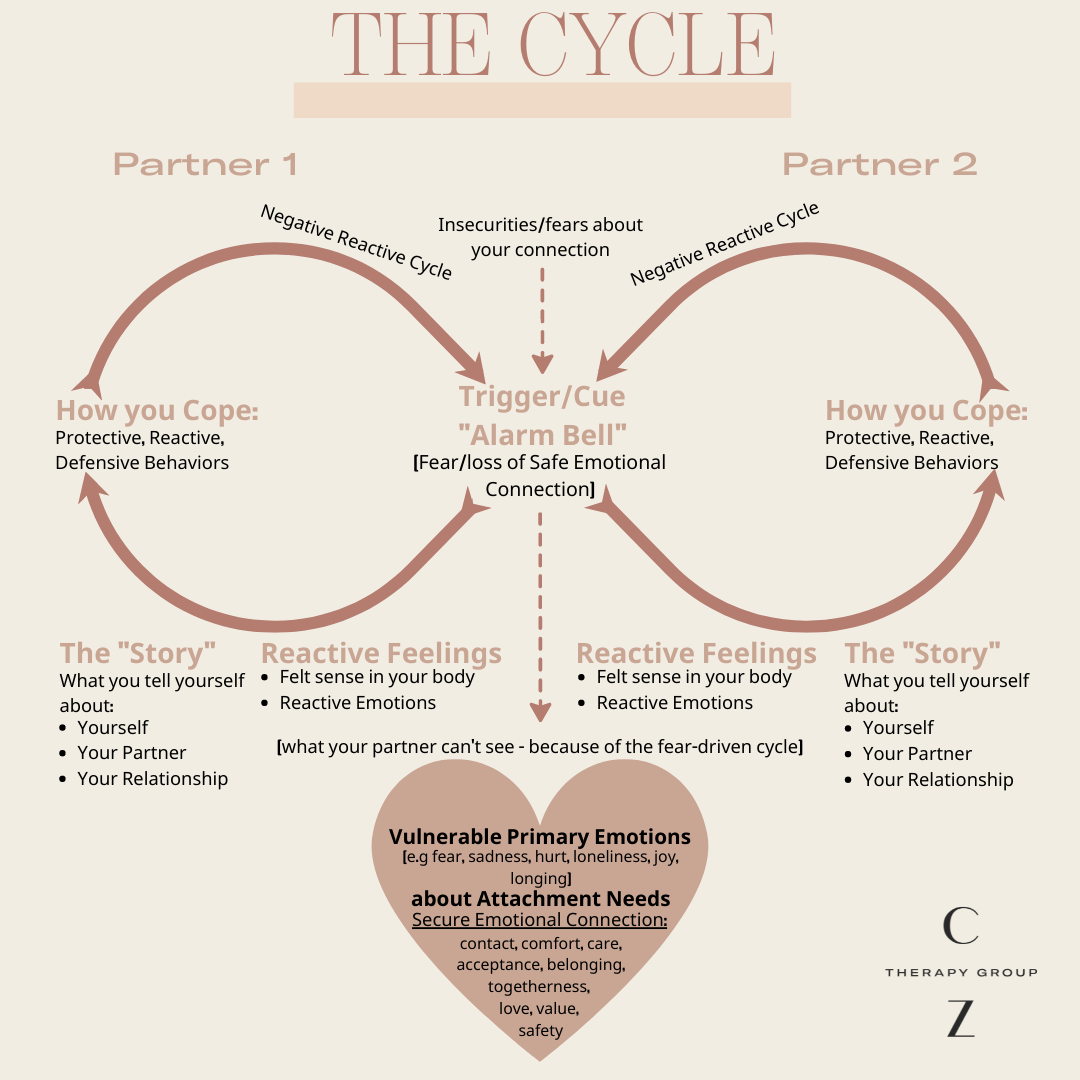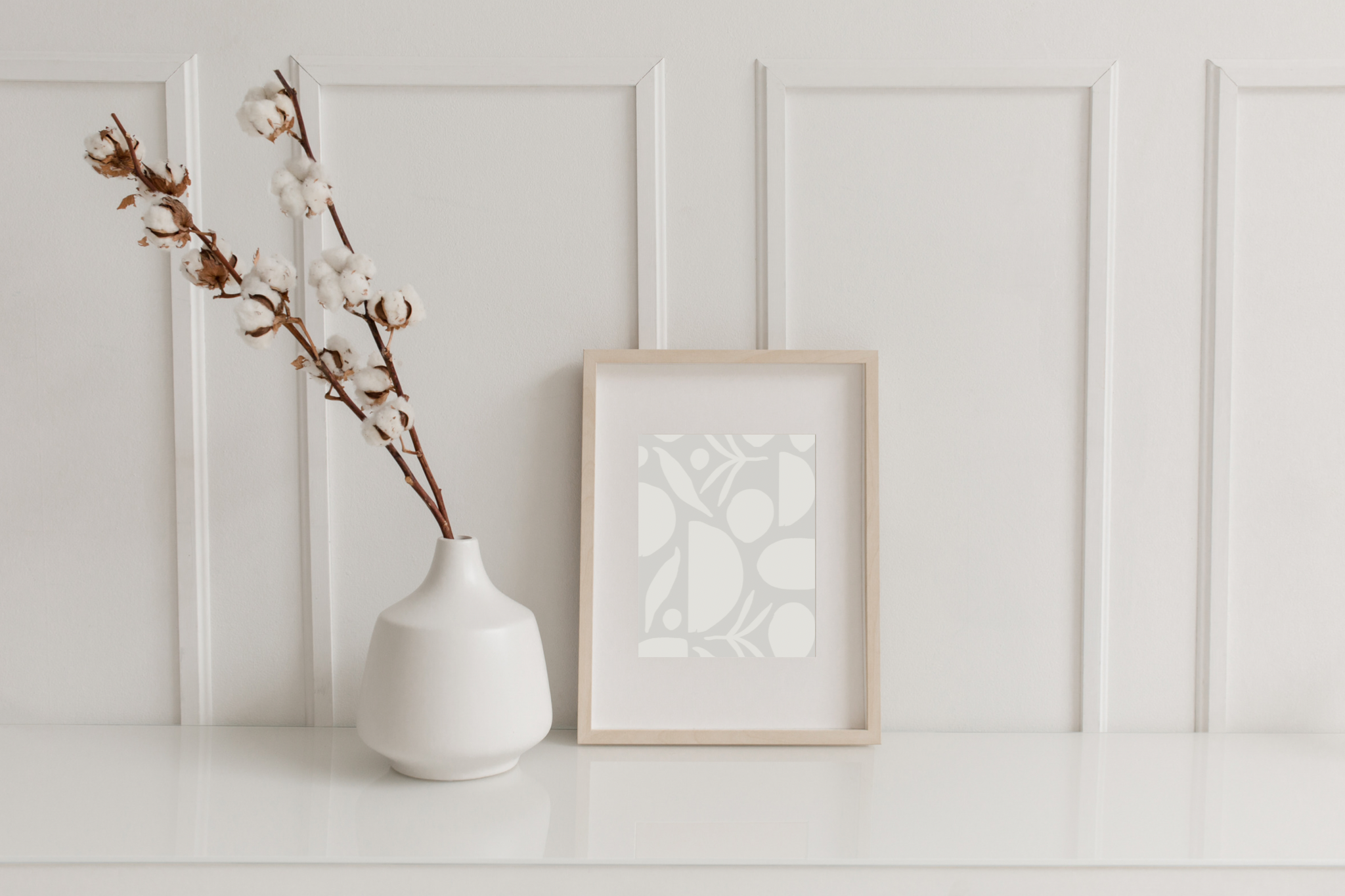The Cycle: Why Couples Fight from an Emotion Focused Therapy Lens
By: Chadley Zobolas, LCSW, MFTC, Denver Couples Counselor
Couples often describe their conflict as enveloping and seemingly unavoidable. Once they’re in it, the momentum seems to knock them off their feet and the next thing they know, they’re spiraling. Anyone who has experienced this knows how overwhelming and emotional it can feel.
We want more than anything to feel seen, understood, and attuned to by our partners. And more often than not, we really want to be able to offer this to our partner in return, too. So why is it that we can get so stuck, even with the best intentions, and continuously miss one another? Let’s break it down.
The Cycle
Emotion-Focused Therapy (EFT), created by Dr. Sue Johnson, outlines this as a couple’s “cycle”. The cycle (see diagram below) takes the shape of an infinity loop, with no start and no end, and where each partner’s actions, emotions, and thoughts trigger and feed off of the other partner’s. When couples are in their cycle, it can feel incredibly painful, confusing, and even hopeless.
The good news is that EFT couple’s therapy is a perfect space to be able to understand what’s happening in your cycle - on your end and on your partner’s end - and learn to do something different.
Before we get any further, I want to take a moment to name something important that we simply don’t have time to touch on in this blog. As a couples counselor who also specializes in trauma therapy in Denver, CO., I simply can’t bypass the profound impact that trauma and early childhood attachment experiences have on relationships and the unique dynamics of each ‘cycle’. I'm so grateful to Jordan Kurtz, my fellow trauma therapist and couples counselor at CZ Therapy Group, for elaborating on this important topic further in adjacent blogs:
Understanding the Components of Your Cycle in EFT Couples Therapy
Outside of couples counseling, a good place to start is by getting curious about your part of the cycle. What’s happening on your half of the infinity loop? How can we make sense of why it’s happening and what you’re needing to look differently? Let’s break down each component together.
Initial Trigger/ Alarm Bell
This refers to what happens that’s upsetting, overwhelming, or completely sets you off.
Some examples:
My partner gave me that look I absolutely hate.
The dishes still aren’t done.
My partner checked out while I was talking to them… again!
Initial Internal Reaction
When the trigger happens, what do you notice happening internally in that immediate moment? Does your heart sink to your gut? Do you get red hot? Do you go numb?
The Story You Tell Yourself
About yourself
Some examples: “I don’t matter to my partner.” or “My needs are too much.”
About your partner
Some examples: “My partner doesn’t care about me.” or “My partner is selfish.”
How You Cope
What do you do in response to the trigger? Some partners:
Walk away or give their partner the silent treatment
Yell at their partner or call them names
Apologize or try to smooth things over quickly
Become short and snippy with their partner
As we start to make sense of what’s happening on your side of the cycle, it’s important to keep in mind that the different components of your cycle - your thoughts, actions, and emotions - are triggers for your partner, too. This is where the other half of the cycle begins to take shape.
Pursuers and Withdrawers
The terms pursuer and withdrawer refer to each partner’s attachment styles or strategies they pull from to attempt to get their needs met in relationships.
Pursuers:
A pursuer in a relationship is a partner who leans towards anxious attachment strategies or reaches towards their partner in times of relational distress and unmet needs.
On the outside, pursuers can come across as being pushy, complaining or ‘nagging’ their partner, and being more verbal during the conflict.
On the inside, pursuers can often find themselves scared of what will happen if they don’t talk through conflict until they find a resolution, and the thought or feeling of disconnection with their partner feels unbearable.
Pursuers reach and reach and reach as a protective strategy and a way to try to get their unmet needs seen and met by their partner.
Withdrawers:
A withdrawer in a relationship is a partner who leans towards avoidant attachment strategies or pulls away from their partner in times of relational distress and unmet needs.
On the outside, withdrawers can come across as dismissive, minimizing, constantly trying to “silver-lining” things, or exploding in an attempt to get space.
On the inside, withdrawers are simply trying to cope with the overwhelm and hurt they’re experiencing in the best way they know how – which is to push down, avoid, and look on the bright side.
Withdrawers pull away because it’s what feels safest and most known, but it’s important that we don’t let that automatic response fool us. Withdrawers are in need of safe, fulfilling attachments with others just like everyone else. They just need to feel safe enough to be able to tap into their attachment needs and voice them.
Many relationships consist of one pursuer and one withdrawer, but it’s also possible for two pursuers or two withdrawers to exist in a relationship with each other as well. Do you have a sense of who’s who in your relationship?
Who is EFT Couples Therapy for?
We often think of couples therapy as a place for relationships that are on the brink of catastrophe. While that’s absolutely true, this doesn’t have to be the only time couples seek support. EFT couples therapy can be preventative so you never have to reach that point in the first place. Even the most fulfilling, connected, and safe relationships have a cycle that deserves to be unpacked and re-shaped.
Our team of Couples therapists utilizes EFT to help you identify your cycle, understand and empathize with both your and your partner’s experience within the cycle, and create an entirely new, positive cycle in its place.
The end result is a more connected, fulfilling, and authentic relationship where each partner feels safe enough to be heard and have their needs met.
Eager to keep diving deep? Learn more on our subsequent blogs
Take the Next Step With EFT Couples Therapy in Denver, CO.
Our team of Denver-based couples therapists is trained in Emotion Focused Therapy and ready to support all relationships on the path towards greater connection and healing. Learn more about our couples therapy services and how couples counseling can support your relationship or reach out for a free consultation with a couples therapist on our team!
Ready to Start EFT Couples Therapy in Denver, CO?
If you and your partner are seeking resolution and connection in your relationship, take a proactive step towards healing and growth by engaging in EFT couples therapy in Denver, CO. Our team of couples counselors and trauma specialists at CZTG provides a safe and supportive space to help couples navigate conflict, rebuild trust, and foster a deeper emotional connection in their relationship. Follow these three simple steps to get started:
Reach out to schedule an initial consult call.
Connect with the Denver couples therapist of your choice.
Start resolving the conflict and moving forward in your relationship!




